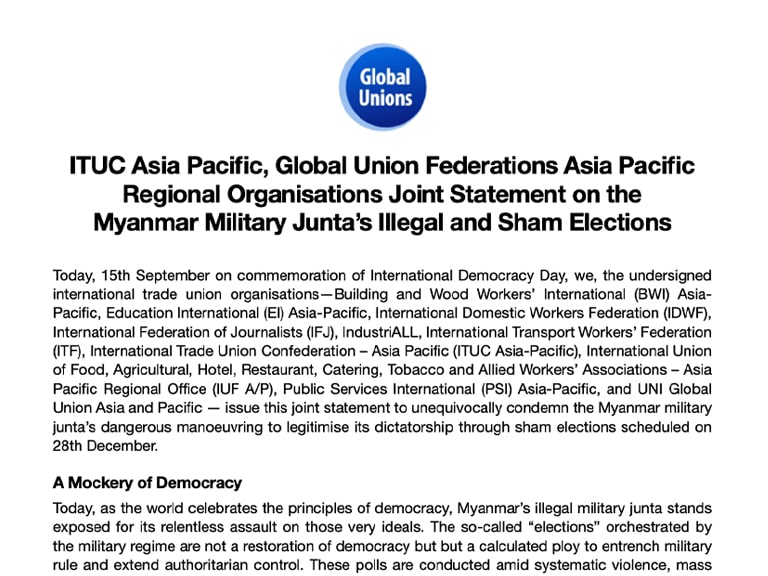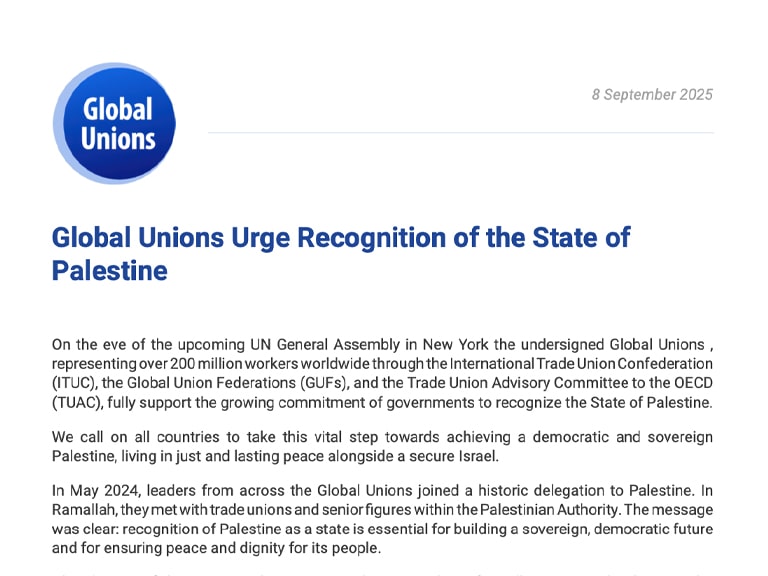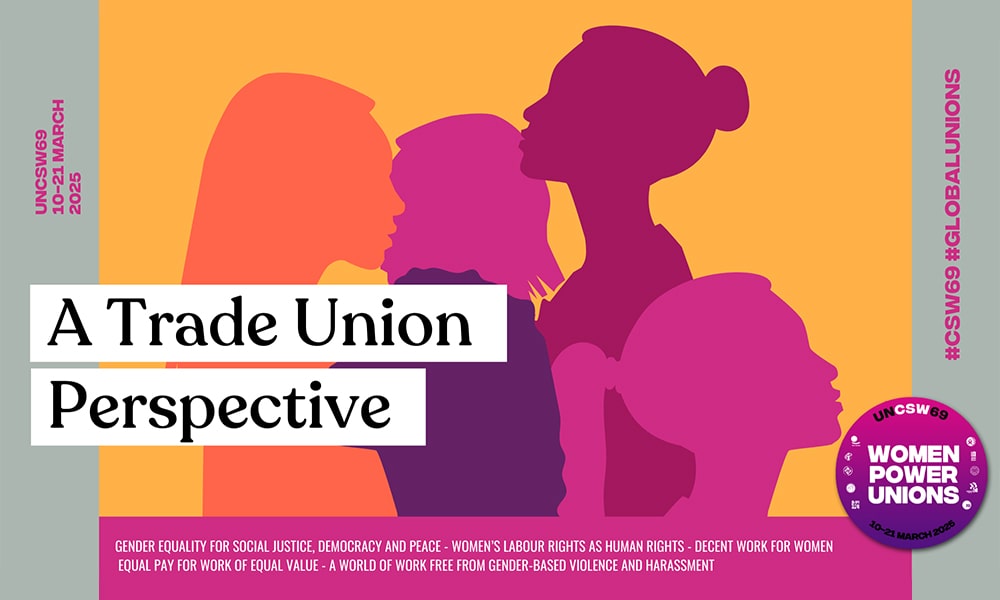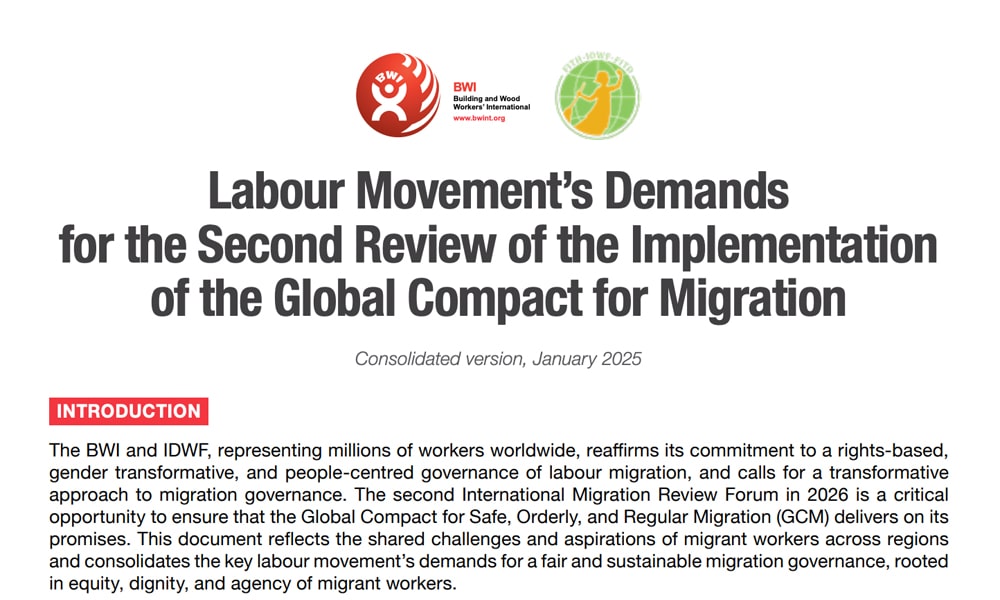64th Session of the UN Commission on the Status of Women:
Global Unions’ Response to the Political Declaration
Statement by: The International Trade Union Confederation (ITUC), Education International (EI), Public Services International (PSI), UNI Global Union, International Transport Workers’ Federation (ITF), International Federation of Journalist (IFJ), International Domestic Workers Federation (IDWF)
As a global trade union movement representing more than 80 million women workers across all sectors and within all supply chains in all regions of the world, we feel compelled to express our profound disappointment with the weak and uninspiring Political Declaration that is the outcome of the procedural one-day meeting held instead of the full 64th Session of the UN Commission on the Status of Women.
This Political Declaration fails to deliver the message of hope, encouragement and commitment that women all over the world expect and deserve. This is a critical year – a moment to reassert commitment to the objectives of the far-reaching Declaration and Platform for Action adopted at the 4th UN World Conference on Women in Beijing 25 years ago.
The Beijing Platform for Action is a ground-breaking and ambitious document that identifies some of the major structural barriers to the enjoyment of women’s human rights. It highlights 12 ‘Critical Areas of Concern’ and outlines 50 Strategic Objectives requiring governments as well as International Financial Institutions (IFIs), the private sector, donor governments, civil society and trade unions to take concrete steps to realise women’s human rights, especially those of the most marginalised, including women of colour.
The Political Declaration adopted by governments at the scaled back 64th Session of the Commission on the Status of Women (CSW64) should have offered a clear assessment of implementation and an ambitious and forward-looking commitment to scale up action.
It should have acknowledged current global threats – whether to peace and democracy, to the environment, to human rights, to workers’ rights or to women’s rights.
It should have offered a progressive and feminist vision to counter these threats and reinvigorate our global, collective advance towards gender equality and social justice.
The CSW64 Political Declaration did none of these things.
Instead, it is abysmally weak and presents no vision for accelerating implementation of the Beijing Platform for Action. The watered down text provides considerable flexibility for Member States to ignore their obligations. For example, language that calls for the ‘full, effective and accelerated’ implementation of the Beijing Platform is undermined by weak suggestions that States ‘consider ratifying or acceding to’ the Convention on the Elimination of Discrimination Against Women (CEDAW), the most comprehensive, legally binding Convention on women’s human rights.
Although the Declaration acknowledges that ‘progress has not been fast or deep enough, that in some areas progress has been uneven, and that major gaps remain and that obstacles, including structural barriers, discriminatory practices and the feminization of poverty persist’, the text is silent about the failure of dominant economic models and fiscal austerity as additional contributing factors to the lack of progress. Factors that were cited by the UN Secretary General in his report to the Commission as having ‘exacerbated inequalities and failed to generate decent work, continue to undermine the effectiveness of action taken by States’.
In fact, the Declaration reinforces failed economic models and policies of austerity and privatization by calling for public-private partnerships (PPPs) to meet commitments to achieve gender equality and the empowerment of women and girls. PPPs and austerity policies have been responsible for ‘systematically eliminating human rights protections and further marginalising those living in poverty’, according to the UN Special Rapporteur on extreme poverty and human rights, and have increased the burden of unpaid care work. States have a responsibility to provide quality and gender responsive public services for all, which are essential for the full enjoyment of women’s human rights.
A clear commitment to decent work, to promoting equal pay for work of equal value, and support for the transition from the informal to formal work in all sectors is included in the Declaration. However, the text could have been further strengthened by adopting language consistent with Sustainable Development Goal (SDG) 8 – specifically target 8.5, which states: By 2030, achieve full and productive employment and decent work for all women and men, including for young people and persons with disabilities, and equal pay for work of equal value.
The failure to recognise the centrality of decent work to women’s economic independence and autonomy, and the need for a transformational agenda advancing women’s leadership and defending the rights of women workers is especially disappointing.
There is no acknowledgement in the Declaration of the core International Labour Organization (ILO) Conventions (C87, C98, C29 – and its protocol P29 – C105, C100, C111, C138 and C182) or of other critical ILO Conventions on gender equality, including C156, C183, C189 and C190 as central to respecting, protecting and promoting women’s right to work and rights at work. These are the only binding international instruments developed through the unique ILO process of tripartite social dialogue, in which governments, employer and worker representatives participate as equal partners. As we saw with the recent adoption of the ILO Convention 190 on the Elimination of Violence and Harassment in the world of work, the tripartite process can deliver broad consensus and make important advances in human rights. C190 is the first international treaty to establish the right to a world of work free from violence and harassment the need to establish measures to address gender-based violence and harassment, as well as recognise and respond to domestic violence when it impacts the world of work. In the context of the push back against women’s rights, this was an achievement worth celebrating in the Beijing +25 Political Declaration.
Trade unions strongly support the Declaration’s reference to recognising, reducing and redistributing unpaid care and domestic work. However, measures should also be taken to recognise the value of unpaid care work, not just to reduce and redistribute it. A strong call for public investment in quality public care services and jobs should have accompanied references to: the role of the state and quality public services and infrastructure in the reduction and redistribution of unpaid care work, and the recognition that work-life balance be promoted without reductions in labour and social protections.
The Declaration states that ‘new challenges have emerged’, but fails to name any of these challenges. At this very moment, rising authoritarianism and extremisms around the world are routinely accompanied by attacks on women’s rights to bodily autonomy. Unprecedented corporate power continues to generate obscene levels of wealth concentration whilst driving down women’s real wages and working conditions. New forms of work organisation, such as digital platform work coupled with the deregulation of the employment relationship, are making work more precarious and informal. The unregulated development of new technologies potentially perpetuates and further exacerbates existing discrimination and inequalities. The threat of mass extinction posed by the climate crisis is already affecting the most marginalised women first and hardest.
It is not unreasonable to expect that governments could produce a 25th Beijing anniversary Declaration that at least gestured towards the significant changes required to advance women’s human rights.
While the Beijing Platform for Action included a specific Strategic Objective on reducing military expenditure and redirecting those funds to provision of public services required for women’s rights, and directed governments to review taxation, the specific means of generating the revenue required to meet development needs are conspicuous by their absence from the Declaration. The growth in the use of tax havens, for example, which hide up to US$30 trillion and deny the public US$500 billion in annual public spending is an obvious barrier to women’s human rights that should have been addressed in the Declaration. There should also have been a recognition of the need for a global minimum corporate tax rate, a method of taxing multinational giants as a single entity and ensuring those taxes are distributed fairly, and establishing a UN tax body.
The Beijing Platform recognised the gendered impacts of a debt crisis and radically called for ‘debt forgiveness’. The Declaration ignores the looming debt crisis caused by private speculative finance and the need to urgently agree to debt workout mechanisms that prevent vulture funds from holding countries hostage and instead place reasonable responsibility on creditors.
The Beijing Platform identifies the environment as one of its Critical Areas of Concern and gives considerable detail on the impact that environmental problems, including global warming, have on women’s human rights. The platform specified that: ‘the major cause of the continued deterioration of the global environment is the unsustainable pattern of consumption and production, particularly in industrialized countries, which is a matter of grave concern, aggravating poverty and imbalances’. In contrast, climate change is referenced in one paragraph of the Political Declaration, which suggests that future State actions will merely be “mainstreaming a gender perspective” into existing climate and disaster policies.
There is no doubt that States missed another opportunity to commit to the urgently needed just and equitable transition of the economy required to avoid catastrophic climate chaos. The Declaration should have outlined actions that could be taken globally to ensure a new green deal is implemented in ways that accelerate equality.
The final paragraph of the Declaration recommits governments to the ‘full, effective and accelerated implementation of the Beijing Declaration and Platform for Action’. If genuine, that renewed commitment requires immediate reforms at international and national levels that have failed to materialise over the last 25 years.
Source: 64th Session of the UN Commission on the Status of Women: Global Unions’ Response to the Political Declaration
Download here






